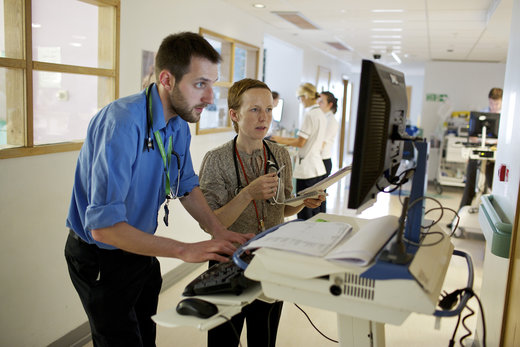Informatics
Informatics is at the heart of our plans to join up care, research and education.
Data is one of our most important assets at King's Health Partners and we have unique strengths in using informatics to improve care, public health, and the efficiency of our health system.
Our aim is to use our strength to improve coordination of patient care, across physical and mental health, increase ownership by patients of their own health records, and to enhance clinical decision making through research and planning.
Read our latest informatics news.
We work with our partners across south east London to develop and test new opportunities to use informatics to advance how we care for our local population.
Informatics in clinical practice
We want to use informatics to improve care and efficiency.
Examples of our work include:
The Local Care Record: we enabled care professionals to view a patient’s medications, previous treatments, test results and any other relevant care information, when it’s needed and at the touch of a button. This helped to improve the care people receive by making the sharing of information faster, safer and more secure. The Local Care Record has been superceded by the London Care Record.
Lambeth DataNet: we’re part of the Lambeth DataNet that uses GP patient records to gather anonymous information to help plan and improve healthcare services. The information gathered is shared by GPs with health organisations, NHS Lambeth Clinical Commissioning Group and university researchers to identify patterns of illnesses and local health needs to help plan the best ways of improving services to make sure everyone can access good health care.
Healthlocker: supports patient-powered health through an interactive website. Developed in consultation with over 450 patients, carers, clinicians, and researchers, the website allows users to take an active role in their recovery and wellbeing.
Through Healthlocker, service users can access parts of their health record including their care plan. They can also keep track of how they are feeling, create goals, and monitor their progress. Users and their carers can also choose to share information with their clinical team. Healthlocker also provides information and advice on managing health and wellbeing.
CogStack: is an information platform that uses advanced search techniques, language processing, analytics and visualisation technologies to unlock health records and assist in clinical decision making and research.
Electronic health record systems are often closed, proprietary and contain incomplete and unstructured data. CogStack implements new data mining techniques that allows clinical text to be searched for specific terms to answer complex queries such as “has this patient received any high cost treatments that have not been captured in their discharge summary?” or “provide me with patients with early onset Parkinson’s disease”.
Watch an introduction to CogStack
https://www.youtube.com/watch?v=XU9ls9J9AmM&feature=youtu.be
Informatics in research_medium.jpg?1429543433)
We use data to power our research and to provide the best evidence based care to our local population.
We have structures in place that include patient and public involvement with researchers, Caldicott Guardians and Chief Information Officers to allow the safe use of NHS data for research.
Examples of our work include:
The Centre for Translational Informatics: drives digital innovation in mental health, finding new ways of improving healthcare using digital technologies and accelerating delivery to patients.
Clinical Record Interactive Search (CRIS): helps us look at large amounts of information stored in patient records more easily so we can start to look for answers to questions about the causes of illness, how we can treat them and how to successfully care for people with these illnesses.
We are part of DigitalHealth.London, London’s digital health hub where leading NHS experts with world-class insight pioneer the development, commercialisation and adoption of digital technologies in health and social care to improve health outcomes.
Where possible we use The Wellcome Trust’s guidance on understanding patient data in our descriptions of our informatics programmes.